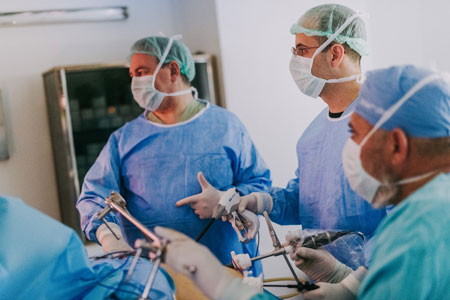Bariatric Surgery

An Overview of Bariatric Surgery:
I need to get rid of these weights!
‘When you consider the risk of co-morbidities that being overweight will bring you, bariatric surgery is a serious option.’
Sometimes neither diet nor exercise can eliminate the problems related to obesity.
Especially if your Body Mass Index is above 40, that means you are overweight and your health is under threat.
There could be many reasons for this.
Our experts are there to investigate these reasons and to offer you the most accurate solution suggestions.
'Morbid Obesity' is a term that describes you as being overweight.
This may lead you to meet many diseases such as obesity, diabetes, high blood pressure or fatty liver at an earlier age.
You should definitely evaluate your options to get rid of these excesses with diet and sports.
Well, what if it doesn't work out again?
In this case, you can consider bariatric surgery with expert advice.
Let's elaborate a little more.
Your body mass index is between 35 and 40, and you are struggling with co-morbidities such as diabetes, high blood pressure, sleep apnea, joint problems.
Options such as diet or exercise do not provide a solution to your weight problem.
Then “bariatric surgery” stands before you as an important option.
If your body mass index is between 30 and 35, you have a first degree obesity problem. If you have co-morbidities related to your weight, such as diabetes, high blood pressure and sleep apnea, bariatric surgery becomes important for you.
Well, since every surgery is a risk, is it worth it?
You will make the final decision in consultation with your doctor.
Because first degree obesity, the psychological burden of being overweight and co-morbidities can leave you with much more serious risks than bariatric surgery.
Before the bariatric surgery decision, it should be checked that there is no medical or hormonal disorder in your body that causes excessive weight gain.
The only proven treatment method that provides long-term weight loss in the majority of morbidly obese patients is bariatric surgery. Of course, the existence of surgery does not mean that these people cannot be successful in losing weight without surgery; some can achieve this, but mostly the weight loss slows down over time and even the lost weight is regained.
Bariatric surgery is not a substitute for exercise and proper nutrition, but it ensures that these goals are sustainable and helps to establish a long-term control mechanism for the solution of the ongoing problem.
To Which Patients Bariatric Surgery is Applied?
It is possible to treat this condition with surgical methods in “morbid obesity” patients who show excessive and diseased obesity.
Because these patients have the potential to develop serious complications.
Surgical treatment is one of the most radical and best-resulting options today.
Although the majority of morbidly obese patients lose weight for a while with diet and exercise programs, the success rate does not exceed 3 percent, in addition, the risks of regaining weight are high.
Metabolism changes in patients undergoing surgical treatment, there is a serious loss of appetite, especially after sleeve gastrectomy, stomach volume decreases and overeating is restricted.
For this reason, it is not very right to compare surgical treatments and medical treatment methods.
Of course, the following reality does not change.
We are talking about an operation and a serious decision.
Therefore, the first treatment approach should always be healthy nutrition, diet and sports.
Many of our patients have tried these options many times; but since they were unsuccessful, they turned to the surgical method.
Multidisciplinary approaches in surgical operation
Surgical operations in morbid obesity patients are important interventions that should be performed with a multidisciplinary approach.
Patients should also be evaluated by an endocrinologist, dietitian and, if necessary, a psychologist. All the values of the patients are examined in detail, especially before the surgery.
Again, before the operation, endoscopy should be performed in order to detect another possible pathology in the stomach.
Patients should be informed in detail by dietitians about how to eat before and after the operation.
Especially in the first period, this follow-up is very important in terms of the adaptation of the diet and metabolism to the new condition. In addition, patients can be examined in terms of their psychological status before surgery.
Patients with serious psychiatric diseases, alcohol or drug addiction, and patients who cannot comprehend the details of the operation are not suitable for morbid obesity surgery.
People who will have morbid obesity surgery should also have full family support, if possible. Family approval, compliance and support are as important as the patient's decision at all stages, from the meal plan at home to the surgical process.
Morbid obesity surgeries are usually performed by laparoscopic, that is, closed method, if there is no other obstacle.
These operations are extremely safe in a specialist doctor and fully equipped centers.
Sleeve Gastrectomy or Gastric Bypass?
Sleeve Gastrectomy
Sleeve gastrectomy is an operation performed by removing approximately 75-80% of the entire stomach. The application is called by this name because the shape of the stomach remaining after the operation resembles a tube. Since most of the stomach is surgically removed and a volume of 50-100 ml remains, the amount of food consumed is limited. Sleeve gastrectomy is a restrictive type of surgery and it reduces the food intake and allows the person to lose weight. Since the appetite hormone (Ghrelin) secreted from the stomach part (Fundus) removed in this surgery decreases after the procedure, patients also experience a serious decrease in appetite. The fact that patients do not return to their old appetites after surgery is a serious advantage that increases success.
Sleeve gastrectomy will not only make you fitter. The main effects of this surgery are related to your health. The effect of surgery on diabetes and hypertension is also quite high. The drugs used by diabetic and hypertensive patients who are treated with oral medication are often not needed. This positive effect starts right after the surgery in patients..
Gastric bypass
It is an operation in which a large part of the stomach is bypassed so that a very small part of the stomach just after the esophagus is left behind. In this application, the stomach is sutured with a special method by bringing the small intestine. Therefore, both the volume of the stomach is reduced and a part of the intestines is disabled. As a result, both the amount of food consumed and its absorption are affected. With this method, the blood sugar control of insulin-dependent diabetic patients is regulated more effectively.
How to Determine Which Method Will Be Applied?
When the results of both operations are examined, it is seen that there is no great difference between the two operation techniques. Sleeve gastrectomy is a more physiological method and has lower rates of complications and operation-related mortality. The application period of sleeve gastrectomy is shorter and it is easy for the surgeon to perform. After both techniques, some patients may regain weight 3-4 years after the surgery. If the technique is sleeve gastrectomy, these patients can undergo resleeve gastrectomy or gastric bypass. If the patient has had gastric bypass before, there is no chance for a second surgical treatment in case of weight regain.
The most important point to know here is that the preferred operation technique should be determined specifically for the patient as a result of the examination and tests to be performed by the physician.
What are the undesirable effects in Bariatric Surgery?
The most important undesirable effect of surgery in both sleeve gastrectomy and gastric bypass technique is leakage and bleeding. After new techniques, technologies and experiences gained, these undesirable effects have decreased and treatment ability has increased.
Both obesity surgery operations are performed laparoscopically and robotically with minimally invasive techniques. Thus, there is no need for deep incisions, operations are performed with closed method and robotic technologies. While these modern methods allow patients to return to their normal life quickly after surgery, they also reduce the rates of pain and wound complications. These operations can be safely performed in pediatric patients and adolescents. It is known that 75% of children who are morbidly obese at puberty will be morbidly obese in the future.
How Old Should I Be for Bariatric Surgery?
In order to have stomach reduction surgery, the patient must have completed adolescence. Bariatric surgeries can be performed after the age of 14 - 15. Today, the upper age limit has also increased; If there is no heart or lung disease that prevents surgery, these procedures can be performed at the age of 70.
What is the real risk?
Morbidly obese people are at much greater risk than gastric surgery risk because of extreme obesity alone. If these people are not treated, they can die 10-15 years earlier than their peers. Let's not forget that morbid obesity itself is a deadly disease.
The fatal risk in bariatric surgeries is around one in a thousand. Considering the health risks morbidly obese patients face due to obesity, the risk of gastric reduction surgery is considered to be a medically acceptable ratio.
Who Cannot Have Bariatric Surgery?
Crohn’s diesease
Leucemia
HIV
Hepatitis C
Active hepatitis B
Cirrhosis
Active alcohol or drug addiction
Untreatable psychiatric diseases







